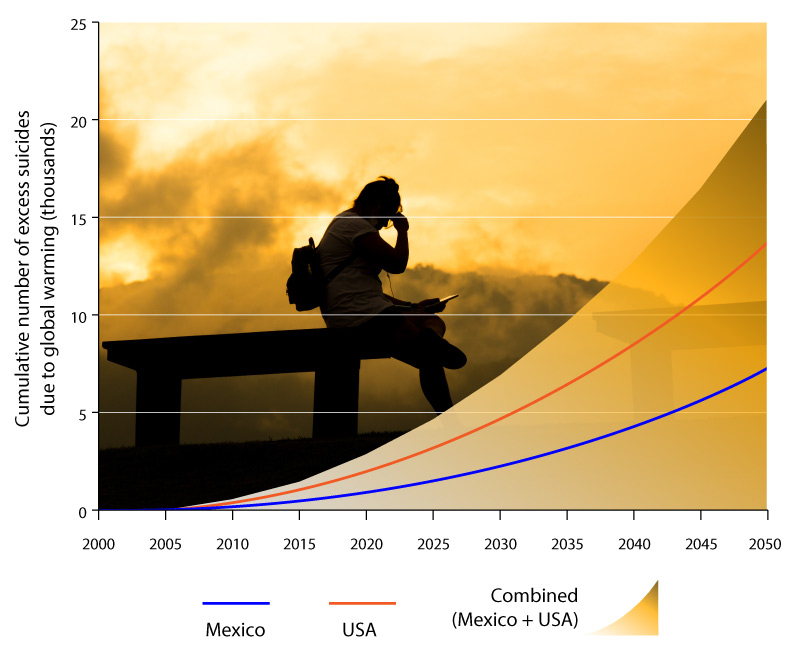
26th July 2018 Global warming will cause thousands of extra suicides in U.S. and Mexico by 2050 A study published in Nature Climate Change finds that the death toll from suicide in the USA and Mexico has risen between 0.7 and 2.1 percent with each degree (Celsius) of increased monthly average temperature. This could lead to an additional 21,000 suicides by 2050.
Suicide rates are likely to rise as the Earth warms, according to new research published this week in Nature Climate Change. The study, led by Stanford economist Marshall Burke, finds that projected temperature increases until 2050 may cause an extra 21,000 suicides in the United States and Mexico. Furthermore, this is only the "medium" scenario for warming; a higher estimate puts this number at 40,000 or more. "When talking about climate change, it's often easy to think in abstractions. But the thousands of additional suicides that are likely to occur as a result of unmitigated climate change are not just a number, they represent tragic losses for families across the country," says Burke, assistant professor of Earth system science in the School of Earth, Energy & Environmental Sciences at Stanford. Researchers have recognised for centuries that suicides tend to peak during warmer months. But many factors beyond temperature also vary seasonally – unemployment rates or the amount of daylight, for example – and until now, it was difficult to disentangle the role of temperature from other risk factors. "Suicide is one of the leading causes of death globally, and suicide rates in the U.S. have risen dramatically over the last 15 years. So better understanding the causes of suicide is a public health priority," says Burke. To tease out the role of temperature from other factors, the researchers compared historical temperature and suicide data across thousands of U.S. counties and Mexican municipalities over several decades. In addition, for more recent years, the team also analysed the language in over half a billion Twitter updates or tweets to further determine whether hotter temperatures affected mental well-being. They analysed, for example, whether tweets contained language such as "lonely," "trapped" or "suicidal" more often during hot spells. The team found strong evidence that hotter weather increases both suicide rates and the use of depressive language on social media. "Surprisingly, these effects differ very little based on how rich populations are or if they are used to warm weather," Burke says. For example, the effects in Texas are some of the highest in the country. Suicide rates have not declined over recent decades, even with the introduction and wide adaptation of air conditioning. If anything, the researchers say, the effect has grown stronger over time. To understand how future climate change might affect suicide rates, the team used projections from global climate models. They calculated that temperature increases by 2050 could increase suicide rates by 1.4% in the U.S. and 2.3% in Mexico. These effects are roughly as large in size as the influence of economic recessions (which increase the rate) or suicide prevention programs and gun restriction laws (which decrease the rate). "We've been studying the effects of warming on conflict and violence for years, finding that people fight more when it's hot. Now we see that in addition to hurting others, some individuals hurt themselves. It appears that heat profoundly affects the human mind and how we decide to inflict harm," explains Solomon Hsiang, study co-author and associate professor at the University of California, Berkeley. The authors stress that rising temperature and climate change should not be viewed as direct motivations for suicide. Instead, they point out that temperature and climate may increase the risk of suicide by affecting the likelihood that an individual situation leads to an attempt at self-harm. "Hotter temperatures are clearly not the only, nor the most important, risk factor for suicide," Burke emphasises. "But our findings suggest that warming can have a surprisingly large impact on suicide risk, and this matters for both our understanding of mental health as well as for what we should expect as temperatures continue to warm."
Comments »
If you enjoyed this article, please consider sharing it:
|







